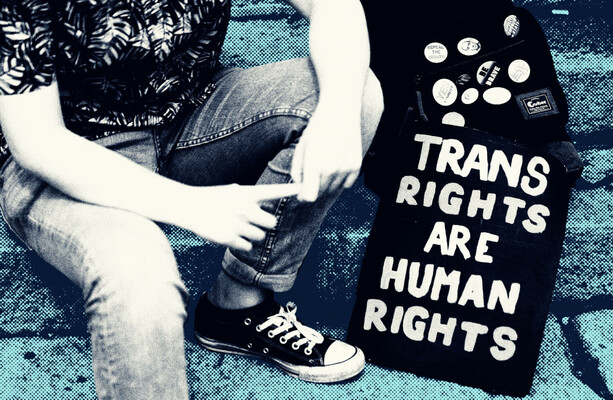‘It left me traumatised’: The barriers to accessing transgender healthcare in Ireland

Advertisement We need your help now Support from readers like you keeps The Journal open. You are visiting us because we have something you value. Independent, unbiased news that tells the truth. Advertising revenue goes some way to support our mission, but this year it has not been enough. If you've seen value in our reporting, please contribute what you can, so we can continue to produce accurate and meaningful journalism. For everyone who needs it. One-off amount I already contribute Sign in. It’s quick, free and it’s up to you. An account is an optional way to support the work we do. Find out more. Investigates Investigates Money Diaries Daft.ie Property Magazine Allianz Home Magazine The 42 Sports Magazine The Journal TV Climate Crisis Cost of Living Road Safety Newsletters Temperature Check Inside the Newsroom The Journal Investigates The Explainer A deep dive into one big news story Sport meets news, current affairs, society & pop culture have your say Or create a free account to join the discussion Advertisement More Stories InvestigatesTransgender healthcare ‘It left me traumatised’: The barriers to accessing transgender healthcare in Ireland The HSE has admitted that transgender healthcare is ‘limited’ and is ‘not meeting people’s full range of needs’. 12.06am, 30 Apr 2025 Share options TRANSGENDER PEOPLE HAVE spoken out about their traumatic experiences in approaches to their healthcare at the National Gender Service (NGS). The Journal Investigates spoke to almost 20 transgender adults about their experiences accessing gender-affirming healthcare in Ireland. They told us of their struggles getting healthcare and highlighted traumatic experiences and long wait times with the NGS. Their accounts all told the same story. Not only are the waiting times distressingly lengthy, the clinical programme currently followed by the HSE is one which some international countries have since moved away from, in particular the requirement for preliminary psychiatric examination. Since 2019, the World Health Organisation (WHO) no longer treat being transgender as a mental or behavioural disorder. Instead, they now see it as relating to a person’s sexual health. The WHO is currently developing guidelines for transgender healthcare. Iceland, Malta and parts of Spain are just some of the regions that have moved away from this model of care. In response to our findings, a spokesperson for the Health Service Executive (HSE) admitted that transgender healthcare services in Ireland “are not meeting people’s full range of needs”, but said that a new clinical programme for gender healthcare is being developed. They added that it will consider “emerging and evolving international evidence” and “be developed in a consultative way” with stakeholders. However, the spokesperson did say that “evidence for the best and safest type of healthcare in this area is limited”. The HSE also said that “waiting times are unacceptably long for the NGS” and acknowledged that “this has caused significant distress” for people. The NGS is failing to provide timely access to healthcare and as a result, many transgender people told us they are forced to take matters into their own hands. The current requirement of an initial psychiatric evaluation also causes issues. Emily*, a transgender woman, said being seen by the NGS was “a very uncomfortable experience”. She added: They seem very interested in everything around your sex life. “I feel like I’ve been forced to become my own endocrinologist”, said Gwen, a trans woman who said she couldn’t wait years to receive healthcare from the NGS. A broken system of care? The NGS is a public service provided by the HSE and St John of God Services for transgender adults seeking gender-affirming healthcare. It does not provide healthcare to children. Our team spoke to four people who made it through the long waitlist. They told us they were questioned about their sex lives and other personal information. They also said decisions relating to their healthcare were sometimes based on employment status or whether they are seen as ‘transgender enough’. Dr Beth McElrea, clinical lead for transgender healthcare in Iceland, told The Journal Investigates that in her expert opinion, questions like these are “completely inappropriate”. She added that, in her view, a person’s employment status is not relevant to their gender identity. This is because best practice, informed by the WHO guidelines, has moved away from this type of evaluation. This process and the years-long waiting list is pushing some transgender people underground and away from accessing healthcare through official channels. A spokesperson for the HSE said that their model of care “is based on a comprehensive multidisciplinary assessment that takes into account all aspects of a person’s health and wellbeing over their lifetime, rather than focusing only on gender”. They added that the benefits of providing gender-affirming healthcare “should exceed any apparent risks”. Transgender healthcare in Ireland is provided by the NGS through St Columcille’s Hospital, in Loughlinstown, Co. Dublin. There is no option to be seen anywhere else in the country, meaning many transgender people must travel just to be seen. In order to be seen by the NGS, you must first be referred by your GP. The service is only offered to those over the age of 18, though the NGS does accept referrals to the wait list from age 17. It has been plagued by long wait times. The HSE said: Current waiting times are over four years and will continue to increase without additional funding. “There are now over 2,000 people on the waiting list to be seen,” the HSE said. This incredibly long waiting list is pushing many transgender people to seek alternative sources of healthcare. Investigations like this don’t happen without your support… Impactful investigative reporting is powered by people like you. Support The Journal Investigates Assessment ‘felt like an interrogation’ The NGS describe their care as a “holistic approach to gender care” and involves “multidisciplinary assessments” before any healthcare is provided. Advertisement In practice, this means an initial assessment takes place before you are seen by an endocrinologist, a specialist in hormone-related health. This typically involves two meetings with at least one psychiatrist, the first of which lasts approximately three hours. Despite the World Health Organisation’s change of approach happening over five years ago, the NGS has continued with the same method of care. A new clinical programme is now being developed, according to the HSE. The Journal Investigates has heard from transgender people who have been through the NGS system. Muireann*, a transgender woman, described her initial assessment as an “interrogation”, with one doctor sitting across from her and another sitting behind her. She said: It was really uncomfortable. It felt like they were surrounding me. During this appointment, Muireann was asked about what pornography she watched, how often she watched it, what subgenres she watched and what she found appealing about it. She felt compelled to answer their questions, fearing she would be denied care if she didn’t. “It left me traumatised,” she said. In the end, she was told that she wouldn’t be referred to an endocrinologist. She said the doctor told her that this was because she hadn’t come out publicly full-time. Muireann, who was in her early 20s at the time, explained that her family weren’t overly supportive and that she had come out to her friends. She was told that she had to be out publicly full-time in order to access healthcare. A spokesperson for the HSE told The Journal Investigates that “while gender is one important aspect of the risk/benefit assessment, we spend a lot more time on non-gender aspects like social health”. This is done, the spokesperson said, to reduce risks of “a decline in social function, general wellbeing, and a deterioration in mental health”. ‘Mental health in a terrible place’ When Muireann got her family on board, she rang the clinic and was told she could now see an endocrinologist. Fifteen months passed without any word from the NGS, despite monthly calls from Muireann and enquiries from her GP on her behalf. During this time, Muireann had to continue to present as feminine, as instructed by the NGS. However, without any medical intervention or hormones, “I obviously didn’t pass very well”, she said. This resulted in her being harassed on the street by strangers. “I had people come up to me and call me a freak to my face and people making comments and laughing at me. My mental health was in a terrible place by the time I went back [to the NGS].” After a year and a half, she was finally seen again, but not by the endocrinologist she was promised. Instead, she was seen by another psychiatrist. She was again told that she couldn’t see an endocrinologist. This time, she said she was told it was because she didn’t have a job. During this time, two of Muireann’s family members were seriously ill and required care and support from Muireann. With the Covid-19 pandemic also hitting at the same time, she said she wasn’t in a position to get a job, something she explained but she felt that she was ignored by the NGS. After this, Muireann said she got upset because it felt like the rug had been pulled from under her. “I thought I’d be seeing an endocrinologist a year ago, and now I was back to square one. They weren’t following the steps they had laid out for me in the first few appointments.” A spokesperson for the HSE told our team that “occupational function” is part of the assessment in order to “understand a person as a whole person in a social context”. Lost faith in the NGS In this same session, the psychiatrist also asked Muireann what clothes she liked to wear now that she had socially transitioned. Muireann said that she enjoyed stereotypical women’s clothing, such as skirts and dresses. “[The psychiatrist] just looked at me and said, ‘I can’t imagine you in a dress’.” Muireann said she lost all faith in the NGS after that appointment and that she was left worse mentally after it. She said that she had to seek counselling to deal with her experience. She asked the support staff at the NGS not to see that psychiatrist again. She was told a note could be put in her file to see another psychiatrist. Despite this, she saw the same psychiatrist the next time she attended the clinic. When asked about this experience, a spokesperson for the HSE said: “We cannot comment on individual patient cases or consultant practices when to do so might reveal information in relation to identifiable individuals, breaching the ethical requirement on us to observe our duty of confidentiality.” After this appointment, Muireann said she felt like she had “no other option” but to begin researching alternative sources of healthcare, even though she’d been scared to go down this route before. She signed up to get hormones from a private provider based in Singapore. It took three weeks before she had her first prescription, compared to waiting for many years with the NGS and still receiving nothing. After receiving her first hormones, Muireann wasn’t able to celebrate. “I was bitter that it had been such a struggle and that something could be so easy and just kept from me for years and years on end.” Muireann was eventually seen by an endocrinologist through the NGS, roughly six months after signing up for the private provider. She was seen even though her circumstances didn’t change. She didn’t have a job as she continued to care for her ill family members. It took her five years from being referred to access this simple form of healthcare through the NGS, compared to three weeks from the private provider. The Journal Investigates is dedicated to lifting the lid on how Ireland works. Our newsletter gives you an inside look at how we do this. Sign up here... You are now signed up The whole experience has left Muireann traumatised and she has lost all faith in the NGS. She said that if she could go back knowing what she knows now, she wouldn’t have sought healthcare from the NGS and signed up for the private provider much sooner. “For a long time, I just kind of blindly trusted and put my faith in [the NGS],” she said, “but then it just all got obliterated”. Questions over NGS being fit for purpose Muireann’s experience with the NGS is not an outlier. The four transgender people we spoke to who had received care from the NGS had experienced such questioning. Sophie*, another transgender woman, told The Journal Investigates that her second session with the psychiatrist at the NGS was cut short because she refused to answer the questions being asked. She said they asked about her partner’s health and personal life as well as private details about their sex life. “We need to know how [prescribing hormones] will affect your sex life,” they told her, but Sophie said that was for her to decide. It also ignored how Sophie had been taking hormones for four years by the time the NGS saw her with no adverse effects, something she told them at the time. “It was like talking to a wall,” she said. Sophie described the experience as “horrible”, adding that the power imbalance that exists in these appointments is “very distressing, very disempowering”. She said: It was everything that is wrong with the medical system in Ireland in one place. The paternalistic attitude, the disregard for our autonomy. A spokesperson for the HSE told The Journal Investigates that “gaining an understanding of sexual function and experience of intimate relationships is an important part of this assessment process”. This is because, they said, “hormone therapy can directly affect all aspects of sexual function, including libido, fertility, and the ability to have sex.” After refusing to answer the questions being asked, Sophie was told that she wouldn’t be provided with healthcare, but that she could join the waitlist again if she wanted. “I was traumatised and I still didn’t get healthcare so what would be the point,” she said. After all she has gone through with the service, Sophie told us she believed “the NGS is not fit for purpose”. “It’s a scandal they’re still doing what they’re doing.” The HSE did not respond to queries about why Sophie was discharged from the NGS, saying they cannot comment on “individual patient cases or consultant practices”. A different approach to care The clinical lead for transgender healthcare in Iceland, Dr Beth McElrea, told The Journal Investigates that questions like those asked by the NGS are, in her view, “completely inappropriate” in the context of current WHO guidelines. McElrea is an Irish GP with a special interest in gender-affirming care who has led the reform of transgender healthcare in Iceland. It now follows an informed consent model, in line with the World Health Organisation’s guidance of depathologising transgender healthcare. She said that the only time it’s relevant to ask anything about sexual orientation is to do with the risk of pregnancy, the risk of STIs and the impact hormones may have on your sexual function. Questions about pornography or someone’s sex life are “entirely inappropriate,” she said, adding, “I can’t think of a justification for asking any of those questions.” McElrea also said that not having a job is, in her expert opinion, “completely irrelevant” to someone’s gender identity and whether they can access hormones. Elsa Bára Traustadóttir said that this model of care is long outdated. She said in Iceland, there is no prerequisite of being out to everyone in your life before accessing hormones. Traustadóttir, a specialist in clinical and forensic psychology and former head of the transgender healthcare team in Iceland, said it’s important to instead encourage people to go at their own pace. She said. People are allowed to dress whatever they like and we don’t base our diagnosis on that. “None of this is necessary for access to hormones, because that’s not helpful.” “Our main concern”, Traustadóttir said, “is to help people improve their quality of life”. “People have to have the right to express themselves as the person they are. They’re not hurting anyone else by doing so,” Traustadóttir added. “So it’s really important that we don’t see people as ‘ill’ just because they’re transgender.” *Names have been changed. The Journal Investigates Reporter: Conor O’Carroll • Editor: Maria Delaney • Main Image Design: Lorcan O’Reilly Investigations like this don’t happen without your support... Impactful investigative reporting is powered by people like you. Over 5,000 readers have already supported our mission with a monthly or one-off payment. Join them here: Support The Journal Conor O'Carroll Send Tip or Correction Embed this post To embed this post, copy the code below on your site Email “‘It left me traumatised’: The barriers to accessing transgender healthcare in Ireland”. Recipient's Email Feedback on “‘It left me traumatised’: The barriers to accessing transgender healthcare in Ireland”. Your Feedback Your Email (optional) Report a Comment Please select the reason for reporting this comment. Please give full details of the problem with the comment... Health Service Executive Investigates thejournal-insta Transgender healthcare News in 60 seconds Power Outage Power restored to over 20,000 ESB customers impacted by outage across west Dublin Champions League Arsenal beaten by Paris St Germain to dent Champions League final hopes daniel lambert Kneecap manager says there has been a ‘concerted campaign from the US’ since Coachella gig Gaoth Dobhair Gardaí rule out foul play in Co Donegal church fire following technical examination Murder Investigation Three people shot dead in Sweden, police say election results Canada elections: A stunning comeback for the Liberals, but more uncertainty ahead Mark Carney's Liberal Party falls just short of Canada majority government, says state broadcaster Investigation into disappearance of Kerry farmer Michael Gaine upgraded to homicide Kneecap has gig cancelled on foot of backlash for 'dead Tory' and 'up Hamas, up Hezbollah' comments Not the 51st State 'Our old relationship with the US is over': Mark Carney’s Liberal Party wins Canadian election Tina Satchwell Richard Satchwell told gardaí he initially kept his wife's body in freezer, murder trial hears more from us Investigates Daft.ie Property Magazine Allianz Home Magazine The 42 Sports Magazine Money Diaries The Journal TV Journal Media Advertise With Us About FactCheck Our Network FactCheck Knowledge Bank Terms & Legal Notices Terms of Use Cookies & Privacy Advertising Competition more from us TV Listings GAA Fixtures The Video Review Journal Media Advertise With Us Our Network The Journal FactCheck Knowledge Bank Terms & Legal Notices Terms of Use Cookies & Privacy Advertising Competition © 2025 Journal Media Ltd Terms of Use Cookies & Privacy Advertising Competition Switch to Desktop Switch to Mobile The Journal supports the work of the Press Council of Ireland and the Office of the Press Ombudsman, and our staff operate within the Code of Practice. You can obtain a copy of the Code, or contact the Council, at https://www.presscouncil.ie, PH: (01) 6489130, Lo-Call 1800 208 080 or email: mailto:info@presscouncil.ie Report an error, omission or problem: Your Email (optional) Create Email Alert Create an email alert based on the current article Email Address One email every morning As soon as new articles come online

















